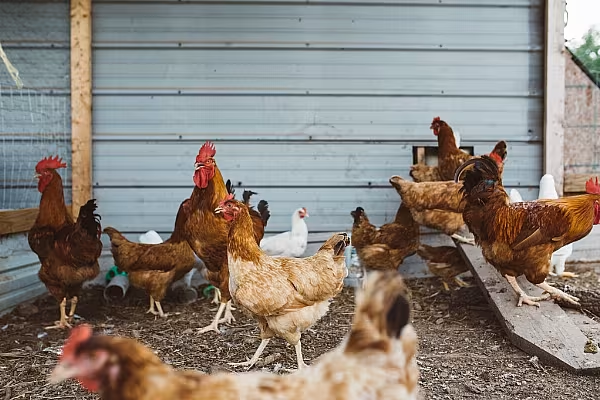China's chicken farmers had been looking forward to a bumper year.
But an unprecedented lockdown on people and goods to curb the coronavirus outbreak has disrupted the short but intense poultry lifecycle, threatening output of meat just as the world's most populous country faces a massive pork shortfall.
China's poultry production expanded by 12% last year to 22.39 million tonnes, after farmers sought to plug the gap from the pork shortage caused by African swine fever that ravaged the domestic hog herd.
About half of China's chickens are raised by individual farmers involved in only one or two steps of the chicken chain, rather than integrated operations.
Restrictions On Movement
But that has made them vulnerable to the restrictions on movement and labour shortage resulting from Beijing's efforts to curb the spread of a new coronavirus that has killed more than 2,200 people and infected around 75,000.
Many roads to villages across the country are still blocked, despite government efforts to ease problems for vital industries like food, hampering feed deliveries and movement of birds.
Some feed mills and slaughterhouses are still shut, while others are only starting to reopen after extended holidays and operating below capacity.
That has upset the flow of a supply chain that starts with the sale of day-old chicks by hatcheries to breeding farms, continues with distribution of broiler chickens to growers, and ends in the slaughter of fattened birds, all in less than a year.
"Every step needs to work at the same pace, otherwise there will be an imbalance," said Pan Chenjun, senior analyst at Rabobank.
Pan Xingle, who raises chickens in Yi county in Hebei province for a slaughterhouse under contract, is still waiting to slaughter 16,000 birds that are already more than 50 days old.
Broilers used for cheap meat by fast-food chains and public canteens reach their maximum weight of 2.6 kg (5.7 lb) in around 40 days.
But the slaughterhouse has only just reopened after an extended holiday and farmers are queuing to kill their chickens.
"I was told I'll need to wait for at least another 10 days," said Pan.
That means Pan won't be restocking his farm with new chicks for a while longer, hurting business for some of the 45 million breeders that raise 'parent stock' around China.
Chicken Prices
Prices for the day-old-chicks sold by those breeders are currently below cost, ranging from 1.4 yuan to 2.5 yuan (about 20 to 35 US cents) per chick. The average price last year was 6.8 yuan.
Zhang Yanguang, manager of breeding farm Beijing Lvyan Poultry Centre located in a village in the northwest of the capital, said even if he could sell his chicks, roads to the village are still blocked, and trucks can neither go in nor out.
Worse, most of the slaughterhouses in the northeast and northwest of China are still shut so he can't get rid of unwanted birds either.
"The whole market is closed down," he said, estimating slaughter capacity is currently only running at around 30%.
If pressure on farms like Zhang's continues past this month, it could force some out of business, said Pan, the analyst, hitting the hatcheries further upstream that raise grandparent stock to produce the breeders.
"Then the hatcheries will have to destroy day-old chicks or eggs," she said.
Tighter Supply
With schools and many factories and restaurants still closed, lower production of chicken and eggs is not yet a problem. But once business returns, supplies could tighten, Pan said.
The effect is likely to be seen in the second and third quarters, an agriculture ministry official said earlier this week.
Similar challenges are facing egg farmers who are unable to get fresh eggs to market nor replace their old hens.
"We are selling our chicks really cheap, as little as 1.5 yuan instead of 4 yuan, so we're losing money," said Wang Lianzeng, chairman of Huayu Agricultural Science and Technology Co Ltd, one of the country's largest hatcheries for laying hens.
That could help farmers like Li Shunji from northern Shandong province who is selling his eggs at a loss because he no longer has access to big markets in Beijing and Tianjin.
But he still has worries. As he waited to take delivery of a new batch of baby chicks, he worried about transport disruption.
"They are so fragile at the moment. Moving them around might lead to their death, or reduce their productivity in the future. But I can't do anything. I will just have to wait."
News by Reuters, edited by ESM. Click subscribe to sign up to ESM: European Supermarket Magazine.














